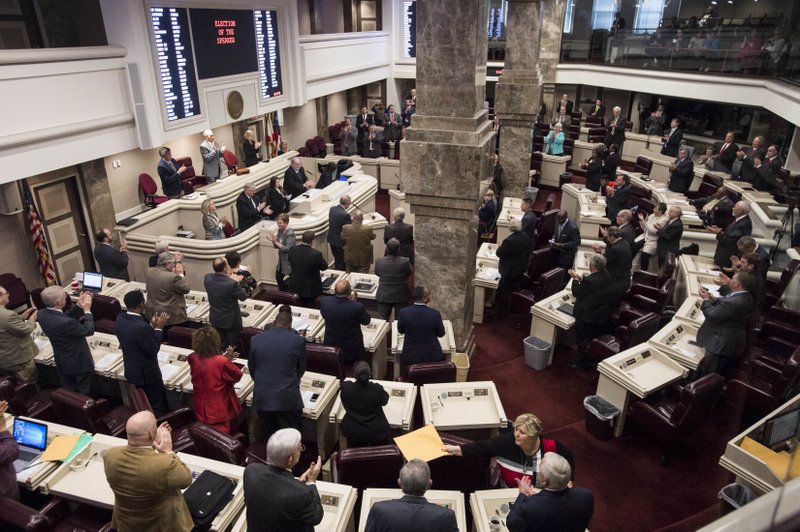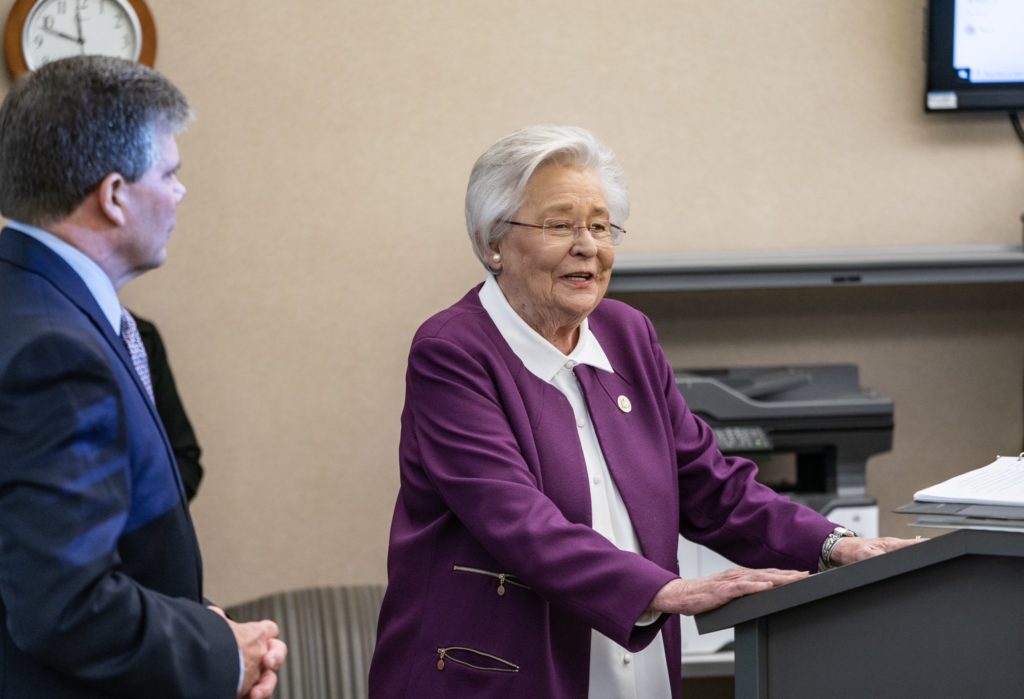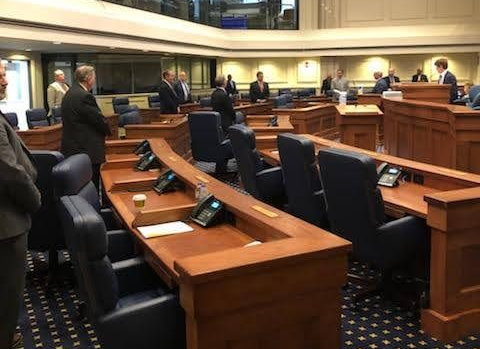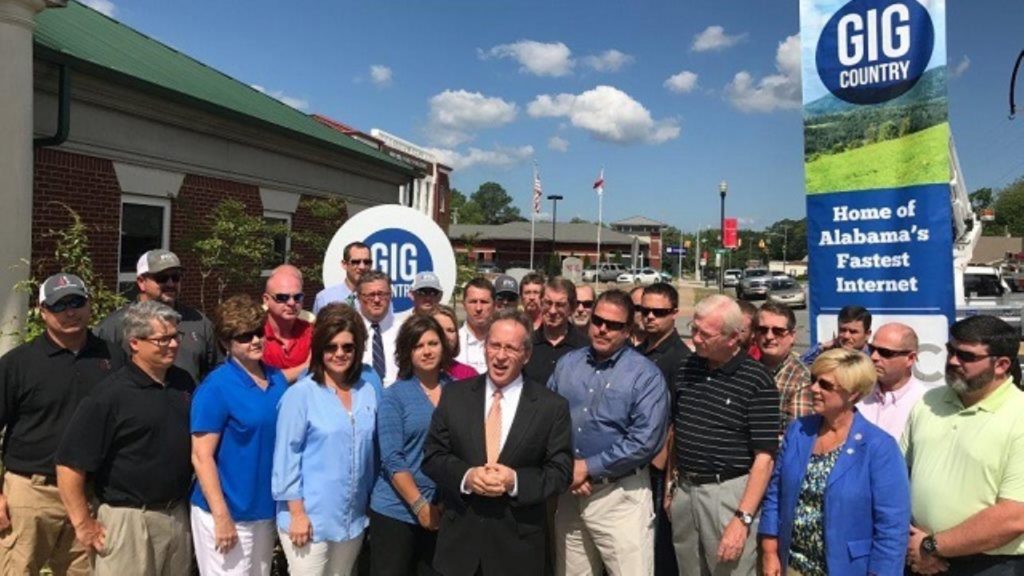Alabama House to consider ambitious special-order calendar on Wednesday

The Alabama House of Representatives will meet on Wednesday at 1:00 p.m. to consider a very ambitious proposed special-order calendar. Senate Bill 206 (SB206) is sponsored by State Senator Clyde Chambliss (R-Prattville). It is being carried on the floor by State Representative Allen Treadaway (R-Morris). SB206 creates the crime of organized retail theft and turns what used to be misdemeanor shoplifting into a felony. Senate Bill 261 (SB261) is sponsored by Sen. Dan Roberts (R-Mountain Brook). It is carried in the House by Rep. Chip Brown (R-Hollinger’s Island). The anti-ESG legislation would prohibit state and local governments from entering into certain contracts that boycott businesses in certain sectors or based on certain environmental or corporate governance criteria. Senate Bill 279 (SB279) is sponsored by Sen. Randy Price (R-Opelika) and carried in the House by Rep. Matt Woods (R-Jasper). SB279 deals with elected county superintendents of education. Under existing law, the salary for an elected county superintendent of education is required to be set by the county board of education before the beginning of the term of office. This bill would remove that requirement retroactive to July 1, 2021. Senate Bill 94 (SB94) is sponsored by Sen. April Weaver (R-Briarfield) and is carried in the House by Rep. Corley Ellis (R-Columbiana). SB94 would move the Shelby County juvenile probation services and probation officers into the state court system. Senate Bill 99 (SB99) is sponsored by Sen. Sam Givhan (R-Huntsville) and carried in the House by Rep. Prince Chestnut (D-Selma). SB99 would increase the mileage reimbursement rate received by jurors Senate Bill 56 (SB56) is sponsored by Sen. Arthur Orr (R-Decatur) and carried in the House by Rep. Allen Baker (R-Brewton). SB56 would require the use of video cameras in certain special education classrooms. Allen is bringing a substitute version of the bill. Senate Bill 292 (SB292) is sponsored by Sen. Roberts and carried by Rep. Joe Lovvorn (R-Auburn). SB292 would provide for the Department of Revenue to grant certificates of exemption from sales and use taxes to contractors and subcontractors licensed by the State Licensing Board for General Contractors for the purchase of building materials and construction materials to be used in the construction of a project for an entity that is exempt by law from paying sales and use taxes. Senate Bill 223 (SB223) is sponsored by Sen. Vivian Figures (D-Mobile) and carried in the House by Rep. Matt Simpson (R-Daphne) would include a child witness in the definition of “a physical offense, sexual offense, or violent offense” for the purpose of the Child Physical and Sexual Abuse Victim Protection Act. Senate Bill 309 (SB309) is sponsored by Sen. Chambliss and carried by Rep. Wood in the House. SB309 is related to contracts for professional services to provide for the procurement of certain professional service contracts based on competitive, qualification-based policies and procedures, as well as to provide for the advertisement of such contracts; and to subject such contracts to a fee schedule established by the Division of Construction Management of the Department of Finance. Senate Bill 198 (SB198) is sponsored by Sen. Orr and carried in the House by Rep. Cynthia Almond (R-Tuscaloosa). It would add additional offenses that would be subject to the presumptive sentencing guidelines; to modify the criminal penalties for criminal solicitation, attempt, and criminal conspiracy; to give a judge discretion when sentencing a person convicted of a Class C or Class D felony offense. Senate Bill 184 (SB184) is sponsored by Sen. Greg Albritton (R-Atmore) and carried in the House by Rep. Kyle South (R-Fayette). SB184 would authorize the Department of Corrections to expend funds for the recruitment and training of law enforcement officers and to further the mission of the department. South will introduce a substitute version of the bill. Senate Bill 224 (SB224) is sponsored by Sen. Figures and carried in the House by Rep. Simpson. It provides for the age of a child for the crime of transmitting obscene material to a child by computer, to establish jurisdiction for a violation of distributing a private image, and further provides for the crime of incest. Senate Bill 281 (SB281) is sponsored by Sen. Albritton and carried by Rep. Margie Wilcox (R-Mobile). SB281 creates a new distinctive license plate to benefit the USS Alabama Battleship Commission. Senate Bill 285 (SB285) is sponsored by Sen. Jones and carried in the House by Rep. Terri Collins (R-Decatur).SB285 will allow nonprofit organizations to host wine festivals. Senate Bill 176 (SB176) is sponsored by Sen Orr and carried by Rep. Collins. SB176 is the Student Right to Know Act of 2023. It requires the Alabama Commission on Higher Education to collect and make available online data for students to plan for their educational and professional futures; and for the Workforce Division of the Department of Commerce to share data and information with ACHE. Senate Bill 192 (SB192) is sponsored by Sen. Albritton and is carried in the House by Rep. Donna Givens (R-Loxley). SB192 would allow private corporations to limit access to industrial facilities and that industrial access roads to continue to be maintained as a public corporation. Senate Bill 263 (SB263) is sponsored by Sen. Donnie Chesteen (R-Dothan) and carried in the House by Rep. Terri Collins (R-Decatur). SB263 makes changes to the Alabama Accountability Act of 2013. It revises the law to change the term failing school to priority school and nonfailing to qualifying school to make other changes. Senate Bill 258 (SB258) is sponsored by Sen. Andrew Jones (R-Centre). It deals with nonprofit corporations that provide water services to the public authorizing a one-time audit by the Department of Examiners of Public Accounts. There is a substitute version of this bill. Senate Bill 103 (SB103) is sponsored by Sen. Orr: and carried by Rep. Almond. It would require the Alabama Ethics Commission to provide exonerating evidence to persons accused of ethics wrongdoing. Almond will introduce a substitute. Senate Bill 76 (SB76) is sponsored by Sen. Will Barfoot (R-Pike Road). It is carried in the House by Rep. Lovvorn. SB76 establishes the Rural Logging Support Act, funding supporting rural economic Development. Wednesday will be Day 28 of the 2023 Alabama Regular Legislative Session. To connect with the author of this story or to comment, email brandonmreporter@gmail.com.
Kay Ivey extolls economic and legislative success in Tuscaloosa

Alabama Governor Kay Ivey spoke to the West Chamber of Commerce on Monday in Tuscaloosa. The governor emphasized her economic policies and her plans to improve Alabama’s public education. Ivey thanked Terri and Coach Nick Saban for their patronage of the Saban Center and said she looked forward to returning to Tuscaloosa for the ribbon cutting. Ivey said the Saban Center would have a lasting positive impact on education in Alabama. “I am so grateful to her and Coach Saban for their commitment to education in the state,” Ivey said. Ivey extolled the current economic conditions. Ivey said Alabama workers have “opportunities not seen in many generations.” “Alabama is experiencing record surpluses in both our educational and general funds to address our state’s needs,” Ivey stated Ivey said that the top priorities for this session and her second term are increases and renewal of economic incentives and improvements in education. Ivey said that with her economic incentives, the state “will need to double down over the next four years to make a lasting difference. Our state’s industrial scouts have brought home many recruits.” “$42 billion in economic investments has already netted an additional 78,000 new jobs,” Ivey said. Ivey said her new economic plan is “The game plan.” It involves renewing the state’s primary economic incentives for another five years. “That is key for economic stability,” Ivey stated. Ivey said her game plan legislation “sailed through the Alabama Legislature with bipartisan success.” “Today, over two million people are employed in the state of Alabama,” Ivey said. “That is the most in state history.” Ivey said the state has “a record low of 2.3% unemployment -the lowest unemployment ever.” “The media asks how are you going to find workers to fill those new jobs. The media takes two positives and turn them into a negative,” Ivey said. The governor explained that her road plan four years ago had already resulted in $370 million for 234 projects that are underway or already completed. Ivey said one of these is the West Alabama corridor, which will be an improved land route to the port of Mobile and “make it easier to get to see Alabama on game day.” The governor said that her widening and deepening of the shipping channel in Mobile would be completed in the next two years. “Increasing broadband access throughout all of Alabama has been a huge priority of mine and will continue over the next four years,” Ivey said. The state has committed over $300 million to broadband projects. Ivey said, “Building a top-notch education system in top thirty states in educational advancement is a goal by the end of my term.” Ivey said that first-class Pre-K expansion was necessary so every child who wants it can access it. Ivey said that children who have been through pre-K are more likely to perform well in kindergarten, are less likely to be chronically absent, less likely to be in special education, and less likely to be behavioral problems. Ivey said that she is, focusing on the building blocks of education: Reading and Math. “We will no longer tolerate the existence of failing schools in our state,” Gov. Ivey said. “I am supporting increased funding for more reading and math coaches.” State Rep. Kyle South is the incoming President and CEO of the West Alabama Chamber of Commerce. “I wish Kyle South all the best in his move from the state house to the West Alabama chamber.” South said that the position allows him to put his business experience and his policy experience together to give back to the community. To connect with the author of this story or to comment, email brandonmreporter@gmail.com.
Personnel Update: Kyle South to head West Alabama Chamber of Commerce

On Thursday, State Representative Kyle South was selected as President and CEO of the Chamber of Commerce of West Alabama. South will resign from his position in the Alabama House of Representatives to accept the position starting in July, so the district will be represented in the remainder of the 2023 Alabama Regular Legislative Session. There will be a special election this summer to select a new representative for House District 16 later this year. South is presently serving in his third term representing House District 16. The Chamber’s Board of Directors voted to hire South Thursday morning. “The opportunity to lead a 120-year-old business advocacy organization is a challenge that I feel my business experiences and serving as an elected official have prepared me for,” South said in a press release. “The Chamber has a solid reputation for serving businesses by collaborating with national, state, regional, and local government entities. I want to continue to build upon those successes with the team in place at the Chamber and the volunteer network of leaders who recognize what we have here in terms of resources and opportunities.” South is a native of Fayette. He represents Fayette, Jefferson, Lamar, and Tuscaloosa Counties. He formerly was the President and General Manager of West Alabama TV Cable Company. The South family-owned cable company was sold in 2019. “Since the sale of the company and the transition into new ownership, I have been patiently waiting for the right opportunity that allows me to bridge my past work experiences, my love for community, and the ability to affect public policy,” said South when he applied for the Chamber job. “I feel that the Chamber position presents that opportunity, and my political experience is a unique qualifier.” South was elected to the Alabama House of Representatives on November 4, 2014. He was born and raised in Fayette and received a bachelor’s degree in marketing from the University of Alabama. He is the father of two daughters. “Today’s announcement is a strategic move for the Chamber,” said board chairperson Michele Coley. “Kyle has the business acumen and existing relationships already in place to continue the important role this organization plays in West Alabama to promote economic prosperity and growth. His abilities to tackle tough issues and seek solutions are qualities that will build upon the solid foundation already in place at the Chamber.” “We would like to thank members of the Executive Search Committee for the many hours invested in the process,” said the Chamber. “Those members include Jheovanny Gomez, Chair-Elect of CCWA, Jalapenos Mexican Grill; Tripp Powell, Immediate Past Chair of CCWA, Yea Alabama; Claude Edwards, Bryant Bank; Matt Fajack, University of Alabama; Chip Fuqua, MBUSI; Katrina Keefer, DCH Health System; Tim Lewis, Tala Professional Services; Blake Madison, Rosen Harwood; Elizabeth Winters, Regions Bank; and Jackie Wuska, United Way of West Alabama.” The former Director resigned earlier this year to take a job elsewhere. Gov. Kay Ivey cannot call a special election for HD16 until South formally steps down. This is a strongly Republican district. Alabama Today is being told by Republican insiders that there is little chance of flipping the district to the Democrats. One prominent Tuscaloosa County Democrat, however, disagrees and said that she would have more to say once Democrats finalize their plans for flipping the seat. Republicans have a commanding supermajority in the Alabama House of Representatives. To connect with the author of this story or to comment, email brandonmreporter@gmail.com.
Steve Flowers: Alabama has a host of outstanding political leaders under 45

It may appear to you and most casual observers of Alabama politics that our Alabama elected officials are old. That observation is accurate when you observe our current leaders in the highest offices. The governor’s office has been held by mature folks in recent years. Our current Governor, Kay Ivey, is 78 and has been the object of national media humor for appearing to be a pistol-toting great-grandmother. Dr. Robert Bentley, her predecessor, was in his 70’s, but he may have been sprier than he appeared. Bob Riley was no spring chicken while governor at age 65, although he looked younger. Our iconic senator, Richard Shelby, retired in January at 88 after a record-breaking 36 years in the U.S. Senate. Our new Senior Senator, Tommy Tuberville, is 68. This was not always the case in the Heart of Dixie. In the period from 1930 through 1970, we elected the youngest political leaders in the nation, beginning with our legendary tandem of United States Senators Lister Hill and John Sparkman, who served together close to 30 years. Lister Hill was elected to Congress from Montgomery in 1923 at age 29 and was elected to the U.S. Senate at age 44. John Sparkman was elected to the U.S. Senate in 1946 at 46 after serving as the Congressman for the Tennessee Valley. If you think Hill and Sparkman were young when they went to Washington, you have not seen anything like the governors we elected from 1946 -1966. James E. “Big Jim” Folsom was 38 when he was elected in 1946. John Patterson was 37 when he was elected in 1958. Patterson was referred to as the “Boy Governor.” When George Wallace was elected to his first term in 1962, he was only 43. When his wife Lurleen Wallace was elected in 1966, she was 40. She died in office of cancer less than two years later at 41. Lurleen Wallace was succeeded by Lt. Governor Albert Brewer, who had been Speaker of the Alabama House at 34, Lt. Governor at 38, and was 39 when he became governor. Bill Baxley was the youngest Attorney General in America when he was elected Attorney General of Alabama at 29 years old in 1970. He had been a 25-year-old District Attorney in Houston and Henry Counties. Baxley still practices law in Birmingham at 81. Well, folks, a cursory look at our current top elected officials may appear old. However, we have a generation of young political leaders arriving on the scene in Alabama. We already have superstars on the horizon and already on the scene who are under 45. Our new United States Senator, Katie Britt, is only 40 years old. She has the ability and youthfulness to be one of Alabama’s greatest senators. She has gotten to the Senate at a younger age than Hill, Sparkman, or Shelby. Marshall County has become the hotbed and breeding ground for the next generations of Alabama political leaders. This beautiful pristine lake area of North Alabama lays claim to Lt. Governor Will Ainsworth, age 41, State Senate Majority leader Clay Scofield, age 42, and State Representative Wes Kitchens, who is 35 and is Vice Chairman of the House Republican Caucus. Andrew Sorrell, the newly elected State Auditor, is only 37. He has a bright future. The brightest star in the Democratic ranks is Huntsville State Representative Anthony Daniels. At age 40, Daniels is a superstar. He is in his third term in the House from Huntsville. He is the Minority Leader in the House. This gentleman is also a successful high-tech businessman in Rocket City. There are several other stars under 45 in the Alabama House of Representatives besides Daniels and Kitchens, including Kyle South of Fayette, Matt Simpson of Daphne, Joe Lovvorn of Auburn, Ben Robbins of Sylacauga, Scott Stadthagen of Madison, Corey Harbison of Cullman, and very young newcomers James Lomax of Huntsville and Brock Colvin of Albertville. Joining the affable and accomplished 42-year-old Senate Majority Leader, Clay Scofield in the powerful State Senate in the under 45 superstar group are Senator Chris Elliott, 42, of Baldwin, Senator Andrew Jones, 38, of Cherokee, and newly elected Senator Josh Carnley from Coffee County who is 44. Alabama has a host of under 45 political leaders. See you next week. Steve Flowers is Alabama’s leading political columnist. His weekly column is seen in over 60 Alabama newspapers. Steve served 16 years in the legislature. He may be reached at: www.steveflowers.us.
House passes legislation requiring first graders to go to kindergarten or pass skills competency test

On Tuesday, the Alabama House of Representatives voted in favor of legislation requiring all incoming first graders to have either attended kindergarten or pass a test proving that they have the competency to enter first grade. Children who fail the test will be forced to attend kindergarten rather than first grade with their peers. House Bill 43 (HB43) is sponsored by State Representative Pebblin Warren, who has carried this legislation for the last few years. “I am back again. I am back with the kindergarten bill again,” Warren said. “This bill is what is referred to as a First Grade readiness bill.” “This issue has become a really important issue in the State of Alabama,” Warren said. “It is a tragedy that we would let a child reach third grade without being able to read competently.” “This bill does not make kindergarten mandatory,” Warren continued. “A child can attend kindergarten or may be in homeschooling, private schooling, or religious schooling. As long as they demonstrate competence, they can enter into first grade.” Rep. Mary Moore asked, “Will this make it mandatory?” Warren answered, “It does not make it mandatory, but the child must pass a skills competency test to be admitted into first grade.” “If their parents aren’t education-oriented, that is the group that is always going to be behind,” Moore said. “We need to make K-4 and K-5 mandatory instead of leaving that up to the parents.” “I agree,” Warren said. “It should be mandatory, but this is a process. This is our beginning step to making it mandatory.” “What I want to see is Alabama’s ranking improved,” Warren said. “It is that foundation that is going to build the foundation of Alabama.” “We need to go back to K to 8,” Moore said. “They get to sixth grade, and they have been left behind, and they just look for that crack to get out without even going to go to high school.” “We are not giving up. We are going to continue fighting,” Warren said. “I have prayed to God, asking him what I can do to get this bill passed.” “I think unless we are going back to a time where a three-year-old goes to pre-K, we need to get that four-year-old in K4,” said Rep. Kyle South. The House voted to adopt the substitute version of the bill that Warren had prepared in the Education Policy Committee in a 92 to 7 vote. Rep. Phillip Pettus said, “I would like to see us mandate kindergarten.” “If this goes through, let’s come back next time and mandate kindergarten,” Warren said. Rep. Danny Garrett said, “The synopsis says that this mandates kindergarten. A lot of people in my district do not want to be mandated kindergarten.” There was some discussion on whether or not a parent could enroll the child in first grade even if they did not pass the skills competency test that will be required for children who did not have kindergarten before first grade. Rep. Terri Collins stated, “I have an actual amendment that spells it out that if they are not ready for first grade that the child shall enroll in kindergarten.” “This is mainly those children who have never been in any kind of organized program before,” Collins explained. “They do not know their numbers. They do not know their letters. They are not ready for first grade.” “Legally, you have to go to school as a six-year-old,” Collins stated. “This amendment says that if that child comes to school as a six-year-old and is not prepared to start in first grade, then they will be enrolled in kindergarten. It will be the best thing for the child at that point.” Rep. Barbara Drummond asked, “Will the parent have the option of placing them in the first grade?” “No, they will start at the most appropriate place,” Collins answered. “This is a friendly amendment,” Warren said. Collins explained that the Alabama State Department of Education would write the first-grade readiness test. The House voted to adopt the Collins Amendment 92 to 5. The House voted to pass HB43 in a vote of 87 to 12. This is the fourth year that Warren carried similar legislation. It has not passed the Senate in the past. Governor Kay Ivey endorsed the bill in her State of the State speech. It has been referred to the Senate Education Policy Committee. Tuesday will be day 14 of the 2023 Alabama Regular Legislative Session. The Alabama Constitution of 1901 limits the legislature to no more than 30 legislative days in the regular session. To connect with the author of this story or to comment, email brandonmreporter@gmail.com.
House Committee approves bill to pay off debt to Alabama Trust Fund

On Wednesday, the Alabama Housed Ways and Means General Fund Committee advanced Senate legislation, SB1, to pay off the final balance on a debt that the Legislature borrowed from the Alabama Trust Fund. Senate Bill 1 is chaired by State Sen. Greg Albritton. State Representative Rex Reynolds chairs the committee. “I expect this to go quick as this committee passed the same legislation as a House Bill last week and passed on the House floor,” Reynolds said. “Since I am carrying the bill, I will turn over this to my Co-Chair, Rep. [Kyle] South.” Rep. Kyle South asked that the bill be brought up. Reynolds said, “SB1 is the exact same bill as HB2. It appropriates $59,975,672 to pay off the balance owed to the Alabama Trust Fund. It is what we committed to under the People’s Trust Act.” The bill received a favorable report, and the committee adjourned. The full House can consider SB1 as early as Thursday. The Senate passed SB1 on Tuesday. The House also passed its trust fund debt bill, HB2, on Tuesday. The Alabama Trust Fund is funded by revenues from the state’s oil and gas leases. It serves as the state’s savings account. A portion (69%) of the investment revenue from the Alabama Trust Fund is used to fund the state general fund (SGF). The remainder of the ATF revenues also funds cities, counties, Forever Wild, and senior services. State SGF revenues dropped from approximately $2.1 billion a year during the Great Recession to $1.6 billion. Once all the reserve fund and federal emergency bailout funds were exhausted, and budget cuts were made, state Legislators were left with the difficult decision. They could release thousands of state prisoners and/or cut benefits for hundreds of thousands of Alabamians who get their healthcare from Alabama Medicaid (which would have resulted in a federal lawsuit). Alabama Medicaid and the Alabama Department of Corrections are the two largest agencies funded by the SGF. Voters in 2014 approved a plan by legislators to raid the $3.2 billion Alabama Trust Fund to avoid devastating general fund cuts The ATF balance was $2,430,232,27 in 2015. As of September 30, 2022, the balance declined by $767 million due to investment downturns to $3.1 billion. The ATF distributed $197.4 million in FY2022. The Senate Finance and Taxation General Fund Committee, chaired by Albritton, met on Wednesday and gave a favorable report to the American Rescue Plan Act appropriations bill, HB1, which appropriates $1,060,000,000 in one-time federal dollars given to the state by Congress. The committee did not take up HB2, so at this point, it appears that SB1 will be the trust fund repayment bill that is best positioned for passage. The full House can now consider the legislation as early as Thursday. The Alabama Legislature is currently in its First Special Session. It is hoped that the body will be able to resume the 2023 Alabama Regular Session on Tuesday, March 21. To connect with the author of this story or to comment, email brandonmreporter@gmail.com.
Innovate Alabama forms Council on Outdoor Recreation

Alabama residents and visitors have long recognized and enjoyed the state’s natural resources, and a new group of leaders wants to leverage those same assets to help benefit and grow the state. Innovate Alabama has established the Council on Outdoor Recreation to advise the board of directors on strategies to achieve three primary goals: expand Alabama’s outdoor recreation industry, enhance the state’s attractiveness for a skilled workforce, and yield substantial returns for rural and urban communities for the enjoyment of current and future Alabamians. The council is supported by the Outdoor Recreation Advisory Roundtable, comprised of 19 stakeholders that represent diverse and comprehensive perspectives from various regions of the state and outdoor recreation fields. The roundtable, which met for the first time November 30, will provide recommendations for capitalizing on Alabama’s recreational assets as innovative economic development tools. “Made up of some of our state’s strongest outdoor recreation experts, the Outdoor Recreation Advisory Roundtable brings together centuries of combined knowledge in the outdoors to provide strategic recommendations on the application of outdoor recreation to enhance Alabamians’ quality of life and support economic development in rural and urban communities,” said Chris Blankenship, Alabama’s commissioner of Conservation and Natural Resources and the chair of the Council on Outdoor Recreation. “We are thrilled to welcome these advisory members who will ensure that all regions of the state and outdoor recreation sectors have a seat at the table as we develop these recommendations.” In 2021, Innovate Alabama joined forces with former U.S. Secretary of State and Alabama native Condoleezza Rice and Stanford University’s Hoover Institution to conduct extensive research into fostering a robust, inclusive economy in Alabama. The research, which culminated in a final report, highlighted the opportunity to leverage Alabama’s natural resources to help attract innovators and encourage them to grow roots in the state. Out of that research, the Council on Outdoor Recreation was formed. “A thriving business ecosystem is holistic,” said Kellie Clark, CEO of AppThink and a roundtable member. “It considers the interest, hobbies, and well-being of entrepreneurs and their families. People build businesses in Alabama, in part, because of our outdoor recreation assets and landscape diversity. Our natural resources – a true advantage that helps us continue to recruit and retain top talent – differentiates us from other innovation-forward states.” “As an outdoor enthusiast and innovation advocate, I am proud to serve alongside fellow subject matter experts who are all focused on creating inclusive, thoughtful solutions through the lens of outdoor recreation that will enrich our innovation ecosystem,” Clark said. Innovate Alabama is working to leverage the state’s broad array of outdoor assets, such as local and state parks, diverse landscapes, and other natural resources, in an effort to showcase and cultivate Alabama’s unique offerings. Advocates say greater investment in these assets, which make Alabama special, will lure and encourage entrepreneurs, both local and from other states, to put down roots in the state. “We are seeing great success by aligning innovation with our outdoor recreation efforts,” said John Kvach, executive director of Singing River Trail and a roundtable member. “Thanks to Alabama’s unique outdoor landscape and outdoor recreation assets, we have the potential to strengthen regional bonds between rural and urban communities to create a thriving statewide innovation ecosystem.” Members of the Council on Outdoor Recreation and the Outdoor Recreation Advisory Roundtable include: Council on Outdoor Recreation Outdoor Recreation Advisory Roundtable Republished with the permission of The Alabama NewsCenter.
Steve Flowers: Incumbency prevails in 2022 State House races

Folks, believe it or not, we are closing in on six months before next year’s election year. The primary election is set for May 24, 2022. In Alabama, all our major constitutional officers are on the ballot next year. The governor’s office is the premier race in the state, and that coveted and powerful post is set for its four-year quadrennial run. Therefore, this big political year is referred to as the gubernatorial year. Those of us who follow Alabama politics have been salivating with anticipation for a cavalcade of great races. However, the power of incumbency has devasted the big year into a yawn. All the major state offices are held by popular incumbents, who are either running unopposed or have minimal opposition. The consolation prize was that there would be the legislative races. After all, this is where the real power in the state rests. You can simply look at where the special interest and PAC money is spent to verify that fact. However, the omnipotent power of incumbency has also encroached on those races. The Alabama House of Representatives has 105 members. There are 77 Republicans and 28 Democrats. The large majority of incumbents are running for reelection – both Republicans and Democrats. The overwhelming majority of these incumbents will have no opposition. However, in the House, there will be some major changes in leadership because of retirement or moving on to new posts. Speaker of the House Mac McCutcheon is not running for reelection. This has created an interesting and spirited race within the Republican Caucus ranks for Speaker. In addition, Victor Gaston of Mobile, who is Speaker Pro Tem, is also retiring. Bill Poole of Tuscaloosa, who chaired the powerful House Ways and Means Education Budget Committee, has left the House to be the State Finance Director. House Rules Committee Chairman Mike Jones of Andalusia is running for the open Senate seat of retiring Senator Jimmy Holley. Two of the freshman House members are running for statewide office. Wes Allen of Troy is running for Secretary of State, and Andrew Sorrell of Tuscumbia is running for State Auditor. In addition, Connie Rowe of Jasper is leaving the House to become an administrative assistant to Lt. Gov. Will Ainsworth. Some of the veteran House members who are choosing to hang up their legislative cleats include Howard Sanderford of Huntsville, Mike Ball of Huntsville, K.L. Brown of Jacksonville, Kerry Rich of Marshall, Allen Farley of Jefferson, Harry Shiver of Baldwin, Mike Holmes of Elmore, and Becky Nordgren of Etowah. The most noteworthy retiree may be Representative Steve McMillan of Baldwin County, who is retiring after serving close to 43 years in the House. Steve has been a quiet yet very effective voice for the people of Baldwin County. They all will be missed. Some of the high profile and powerful members of the House, who will return for another four years with no or token opposition, are Steve Clouse of Ozark, Nathaniel Ledbetter of Dekalb County, and Danny Garrett, Jim Carns, David Wheeler, and David Faulkner of Jefferson. Danny Garrett has ascended to Chairman of the House Ways and Means Education. Other leaders returning are Chris Pringle, Reed Ingram, Randall Shedd, Tracy Estes, Chris Sells, David Standridge, Ginny Shaver, Jim Hill, Alan Baker, Joe Lovvorn, Chris Blackshear, Kyle South, Paul Lee, Jeff Sorrells, Rhett Marques, Steve Hurst, Joe Faust, and Margie Wilcox. The Democratic leadership will remain intact. There is an illustrious array of House Democratic leaders, including Anthony Daniels, Chris England, Laura Hall, Peb Warren, Barbara Boyd, A.J. McCampbell, Berry Forte, Dexter Grimsley, Thomas Jackson, Kevin Lawrence, Mary Moore, Juandalynn Givan, and veteran John Rogers. Two of the Democratic House veterans from Jefferson County, Louise Alexander and Merika Coleman, are both running for an open Jefferson County Senate Seat, leaving both their House seats up for grabs. There may be an increase in the number of females in the House of Representatives. It has already begun with the election of Cynthia Almond of Tuscaloosa, who was elected without opposition to replace Bill Poole. In addition, Patrice Penni McClammy won the Montgomery District 76 seat of her late father, Thad McClammy. She won with no opposition. See you next week. Steve Flowers is Alabama’s leading political columnist. His weekly column appears in over 60 Alabama papers. He served 16 years in the state legislature. Steve may be reached at www.steveflowers.us.
Rep. Kyle South drafts oversight legislation in wake of Maori Davenport-AHSAA controversy

Fayette-Republican, State Rep. Kyle South has drafted legislation that would provide government oversight over the Alabama High School Athletic Association (AHSAA). South drafted the bill in response to a controversial decision by the AHSAA regarding the eligibility of Charles Henderson High School basketball standout Maori Davenport. AHSAA ruled Davenport ineligible for amateur status, which is necessary to play high school sports in Alabama, because of a clerical oversight associated with her play on the Team USA basketball team. Davenport had self-reported the oversight, and immediate actions were taken to rectify the situation. South said the bill will be pre-filed for consideration in the 2019 regular session, and, currently, 87 of the 105 members of the Alabama House have already signed on as co-sponsors. “Rather than taking special circumstances into consideration and impartially considering the facts at hand, the Alabama High School Athletic Association has created an unnecessary national controversy and callously ruled in a manner that adversely affects an innocent young woman’s eligibility,” South said. “Time and time again, the AHSAA has engaged in behavior and ruled in a manner that clearly calls for more oversight of its actions. Considering the AHSAA receives a majority of its funds from taxpayer-funded public schools and the athletic activities of public school students, there is ample justification for government oversight of its operations.” Under the provision’s of South’s legislation: The State Board of Education would be required to review and approve any rules relating to student participation and eligibility before being adopted by AHSAA. Would require 25 percent of the AHSAA governing members to be appointed by the state superintendent of education or the state board of education. Would require the Department of Examiners of Public Accounts to audit AHSAA in the same manner as a state agency in Alabama.
Here’s everyone the NRA has endorsed in the 2018 election cycle

An endorsement from the NRA‘s Political Action Committee, the NRA Political Victory Fund (NRA-PVF), can be a game changer for many candidates. “When provided with the facts, the nation’s elected officials will recognize that “gun control” schemes are an infringement on the Second Amendment and a proven failure in fighting crime” says the fund. “The importance of this premise lies in the knowledge that, as one U.S. Congressman put it: ‘The gun lobby is people.’” The NRA-PVF makes its decisions based on voting records, public statements and their responses to their NRA-PVF questionnaire. Here are the candidates who the NRA has endorsed, who they believe will stand up for Alabamian’s Second Amendment rights: Statewide races Governor: Kay Ivey Attorney General: Steve Marshall Agricultural Commissioner: Gerald Dial State Senate Races District 4: Paul Bussman District 6: Larry Stutts District 8: Steve Livingston District 10: Mack N. Butler District 12: Del Marsh District 21: Gerald H. Allen District 22: Tom Butler State House Races District 10: Mike Ball District 12: Corey Harbison District 14: Tim Wadsworth District 16: Kyle South District 22: Ritchie Whorton District 23: Tommy Hanes District 31: Mike Holmes District 33: Ronald G. Johnson District 45: Dickie Drake District 48: Jim Carns District 49: April Weaver District 65: Elaine Beech District 88: Jeremy Arthur District 105: Chip Brown
Alabama makes strides in bringing high-speed internet to rural communities

Fiber infrastructure is a key tool in attracting new and expanding businesses across Alabama, and local providers are actively working to install innovative internet technologies, particularly in the state’s rural areas. In recent years, AT&T has invested nearly $1.2 billion in Alabama to enhance its wired and wireless networks, in both urban and rural areas. While AT&T has been deploying fiber in Alabama since the mid-1980s, a new initiative allows local leaders to designate industrial parks, office campuses and other business locations as “AT&T Fiber Ready” and use that message in marketing materials. “In today’s world, internet connectivity is an important part of the puzzle,” said AT&T Alabama President Fred McCallum. “No matter the size or the sector, companies rely on high-speed internet access to grow and scale their business.” “Our goal with Fiber Ready is to highlight the existing presence of fiber optics and high-speed communications infrastructure and — hopefully — in turn, support economic developers and local leaders as they diligently work to attract new businesses and drive growth for the businesses that already call Alabama home.” To date, 31 sites in the state have been designated Fiber Ready. Rural targets Other local providers are also making strides in boosting connectivity in the state. Just last month, Farmers Telecommunications Cooperative Inc. (FTC) announced a new fiber infrastructure investment in Marshall County, starting in Albertville and later moving into Boaz and Guntersville. Angela Till, deputy secretary of the Alabama Department of Commerce, speaks at an AT&T Fiber Ready event in Prattville. (Made in Alabama) The Rainsville-based company serves the northeastern corner of Alabama, including Jackson, Marshall and DeKalb counties. In 2015, FTC was the first provider in Alabama to launch active Ethernet-Based GIG internet to residents and small businesses. “Active Ethernet service essentially means each customer is served with a dedicated fiber from the serving wire center,” said Fred Johnson, FTC’s executive vice president and general manager. “This means that from the wire center to the customer there is dedicated bandwidth rather than a sharing of bandwidth between customers as in the case of a passive optical network (PON).” In all fairness, Johnson continued, the public internet itself is shared bandwidth, so that distinction must be allowed. “Nevertheless, assuming that wire centers are adequately supported, as ours are, with high-capacity links, the customer experience is improved because there is less shared bandwidth in the distributed portion of the network,” he said. “A PON essentially takes a single fiber and ‘splits’ it multiple times among a group of customers who effectively share the bandwidth of that fiber.” Johnson added that every business park in the FTC service footprint has optical fiber available. Service may be provisioned in any of those parks up to and beyond the 1 Gig level. “Having ‘GIG’ residential service available has brought the area a degree of notoriety — we have an even more robust system than the ‘Gig Poster Child’ of Chattanooga — but is less significant economically than the even higher capacity afforded the business and industrial community,” Johnson said. “The local economic development associations inform us that almost every prospect checks off broadband availability as a condition precedent to any further evaluation. To date, I am unaware of FTC’s facilities failing this checkoff. They are literally as modern as any in the country.” Recruiting 21st-century jobs Alabama Sen. Clay Scofield of Guntersville said FTC is providing critical support to the quality of life in the region. “We’re very excited that Farmers has made the decision to expand in Marshall County,” he said. “It’s a significant investment that we think is going to have a huge impact on economic development in our area.” The region is trying to recruit 21st-century jobs, Scofield said. “The only way we’re going to be able to do that is with this type of infrastructure,” he said. “From here and into the future, high-speed internet is going to have to be just as important for a utility to offer as power and water are. “It’s going to be critical that our communities throughout the state of Alabama have access to this if we want to really grow, not only to recruit jobs but also to recruit people to live in those areas.” Scofield is sponsoring legislation that would provide incentives to companies to expand broadband into rural and underserved areas of the state. “It’s very costly to expand as it is, and in our more urban and suburban areas, it’s easier for companies to make it profitable. But in rural or poor urban areas, it’s not as profitable for them to expand,” he said. Scofield’s bill stalled in the House during the last legislative session, but he continues to work on it and intends to introduce it again in the next session. He said he recently spoke to the Marshall County Realtors Association, and he asked them how many of their clients inquire about internet connectivity before they purchase a home. “Every hand went up. This is really going to affect smaller areas’ ability to recruit people to move there,” he said. It’s also important when it comes to training the workforce of the future, Scofield said. “We’ve done a great job in Alabama of getting technology into the classroom, but what happens when those students go home? I think this is critical when we look at workforce development and training to make sure we have connectivity,” he said. ‘Highways of the future’ Alabama Rep. Kyle South of Fayette, who also is general manager of West Alabama Cable TV, agreed that a robust fiber infrastructure is key to a region’s economic growth. Officials in Thomasville celebrate the arrival of AT&T’s Fiber Ready initiative in the rural Alabama community. (Contributed) “There’s no question it’s terribly important,” he said, citing the automotive industry as an example of the industries that rely on the network. Suppliers and auto manufacturing plants operate on a just-in-time strategy, with parts being shipped and received as they are needed. “There’s no way they can stay on schedule without proper communication between
Millennial Alabama lawmakers launch bipartisan Future Caucus

Millennials officially became the America’s largest living generation last year, according to data from the U.S. Census Bureau. As more of them get involved in politics and advocacy, a group of Alabama lawmakers want to make sure their voices are heard in the state Legislature. On Thursday, a bipartisan group of state legislators under the age of 40 came together to form the Alabama State Future Caucus. Together, these young and innovative legislators have committed to working on the issues facing millennials and future generations. Led by 36-year-old Republican Rep. Kyle South of Tuscaloosa and 40-year-old Democratic Chris England also of Tuscaloosa, the Future Caucus is part of a nationwide movement of millennial legislators who are seeking to find common ground in an era of hyper partisanship. Members of the caucus will work to break through partisan gridlock and reestablish political cooperation. An initiative of the Millennial Action Project, there are now 17 Future Caucuses in state legislatures across the country making it the largest nonpartisan organization of millennial elected officials in the United States. “Millennial Action Project is thrilled to expand its State Future Caucus network in the South, with Alabama today joining Florida and Georgia. It’s encouraging that Reps. England and South are committed to working together, across party lines, to make sure that our voices are heard at the state capitol,” said Steven Olikara, Co-Founder and President of Millennial Action Project. “Millennials have the power to shape the future of politics in our country, if today is any indication, we have a bright future ahead of us.” Defined as young adults ages 18 to 34, millennials make up 27.1% of the state’s population. According to Forbes, millennials will make up 46% of the workforce by 2020. Even now the millennial generation accounts for over 33% of the national workforce, making the new caucus’ work even more important to the future of Alabama. “I’m honored to serve as a Co-Chair of the Alabama Future Caucus and with my colleagues, support the work of the Millennial Action Project as we work to find new and innovative ways to tackle political issues that are important to younger generations,” said England. South noted, “I’m thrilled to lead the Alabama Future Caucus with Rep. England to ensure that the concerns of millennials are a priority when the Alabama House of Representatives sets its agenda each session.” Watch the announcement of the Alabama State Future Caucus below:


